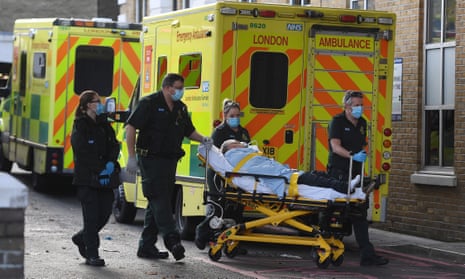Ambulance workers across England intend to strike before Christmas after voting in favour of industrial action over pay and staffing levels.
Unison, the UK’s biggest trade union, announced the results of its month-long NHS strike ballot and said thousands of 999 call handlers, ambulance technicians, paramedics and their colleagues working for ambulance services in the north-east, north-west, London, Yorkshire and the south-west are to take industrial action.
Unison’s general secretary, Christina McAnea, said: “The decision to take action and lose a day’s pay is always a tough call. It’s especially challenging for those whose jobs involve caring and saving lives.
“But thousands of ambulance staff and their NHS colleagues know delays won’t lessen, nor waiting times reduce, until the government acts on wages. That’s why they’ve taken the difficult decision to strike.
“Patients will always come first and emergency cover will be available during any strike. But unless NHS pay and staffing get fixed, services and care will continue to decline.
“The public knows health services won’t improve without huge increases in staffing and wants the government to pay up to save the NHS. It’s high time ministers stopped using the pay review body as cover for their inaction.
“Jeremy Hunt, Rishi Sunak and Steve Barclay must roll up their sleeves and start talking to unions about how better wages for staff can help start to turn the NHS around.”
More than 80,000 health workers across England have voted to go on strike, and although the vote was just below the 50% threshold in many trusts, ministers should be in no doubt about the level of anger and frustration from NHS workers, said Unison.
after newsletter promotion
The union’s health committee is analysing the results of the ballot and will decide what happens next.
Health workers belonging to Unison in Northern Ireland have already voted to take action over pay and staffing.
In Scotland, Unison is recommending that its NHS members vote to accept the latest offer from the Scottish government, which will see a £2,205 increase for the lowest-paid staff, and more for those on higher bands.
That vote closes on 12 December. In Wales, the threshold necessary for strike action was not met anywhere, and its health committee is to meet to decide on its next steps.
Earlier this week, it was announced that nurses in England, Wales and Northern Ireland are to strike for two days in December in what is believed to be their biggest stoppage in the NHS’s history. The Royal College of Nursing (RCN) announced strikes on 15 and 20 December in its pay dispute with the government.
The RCN said it had been given no choice after ministers refused to reopen talks. The health secretary, Steve Barclay, said the RCN’s demands were not affordable, adding that he “deeply regretted” union members would be taking action.
Earlier this month, Unison and the RCN were among several unions that met Barclay to discuss the growing NHS “workforce crisis” and to urge the government to take action on wages.
